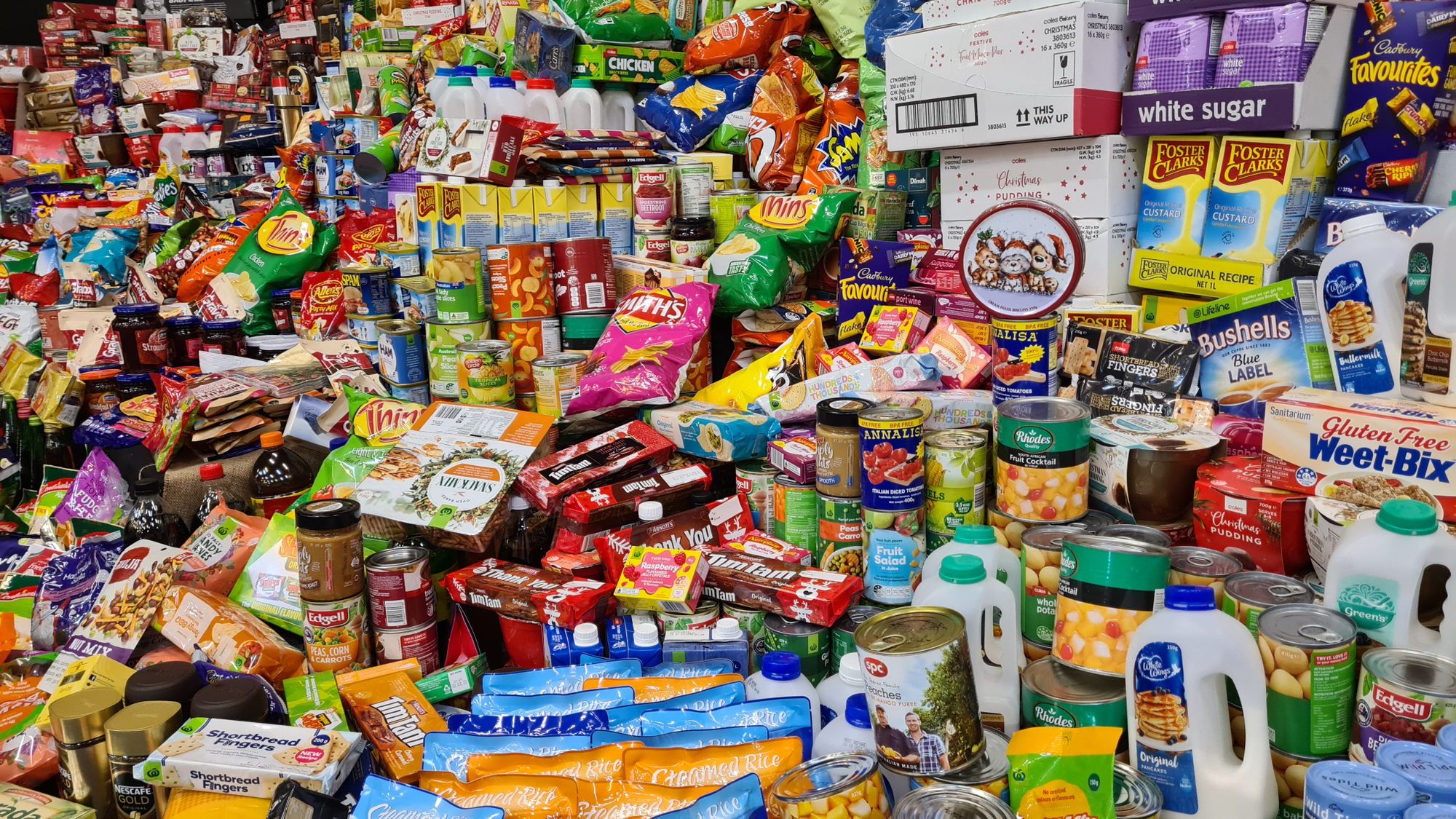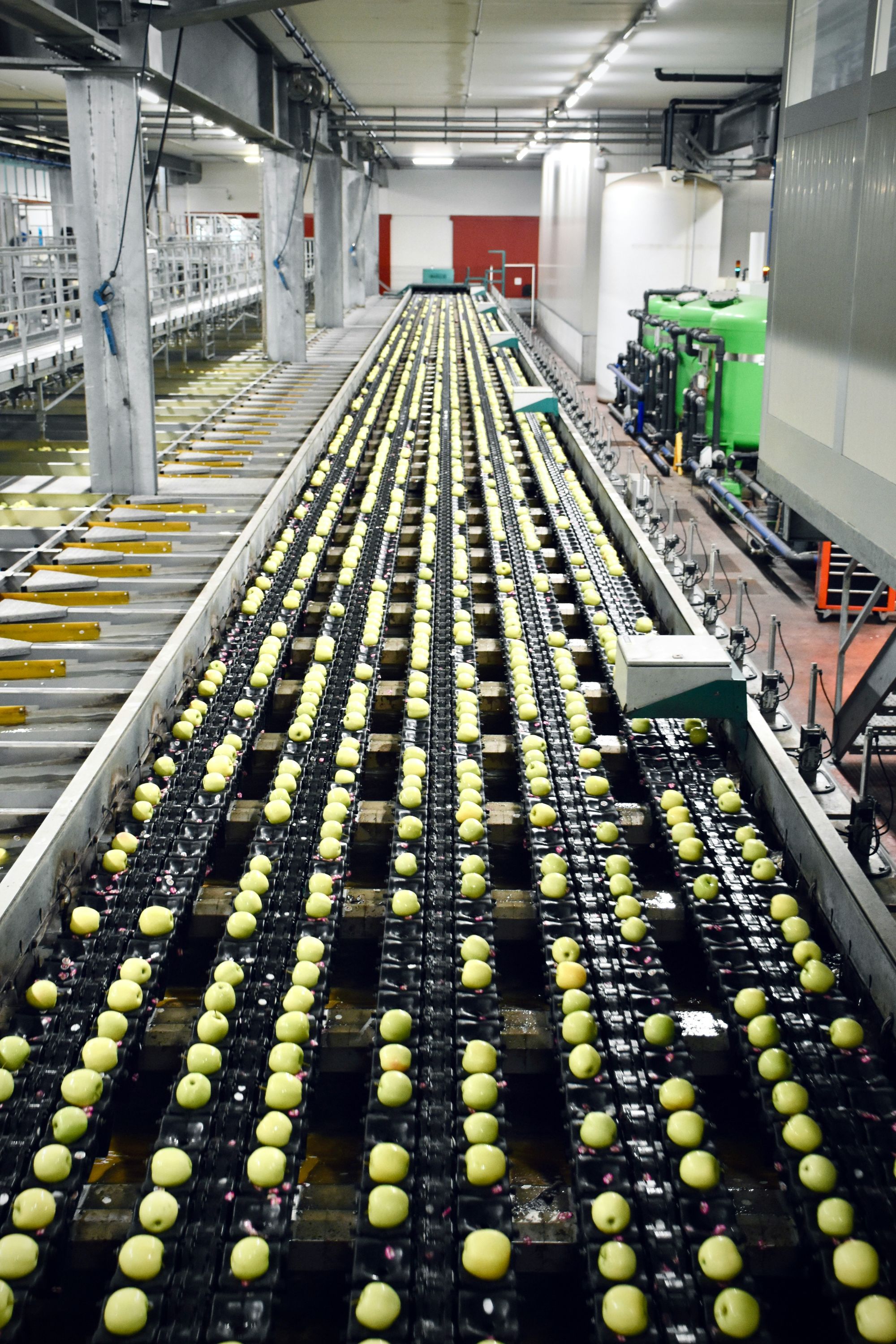Are you seeking to increase your company’s competitiveness in the food and beverage industry? Do you feel that better inventory management is one of the keys to this? If your answers to these questions are yes, then you are on the right page.
In the fast-paced and complex world of the food and beverage industry, effective inventory management is crucial for success. As businesses strive to meet customer demands while minimizing costs and ensuring compliance with stringent regulations, the role of technology becomes increasingly vital.
This is where food and beverage ERP (Enterprise Resource Planning) systems emerge as transformative tools, offering tailored solutions to elevate inventory management practices.

Food and beverage ERP are those manufacturing software systems that are specifically designed to address the unique challenges faced by businesses in this industry. From managing perishable ingredients to ensuring compliance with food safety regulations, these systems streamline processes, enhance visibility, and empower decision-making.
In this discussion, we will explore how food and beverage ERP systems elevate inventory management, driving efficiency, reducing costs, and ultimately, supporting growth and success in a competitive market landscape.
The topics covered in this article are:
- What is the Food and Beverage Industry?
- What is Inventory Management in the Food and Beverage Industry?
- Importance of Elevating Inventory Management in the Food and Beverage Industry
- What is Food and Beverage ERP?
- How Food and Beverage ERP Elevates Inventory Management
- How can Deskera Help in Elevating Inventory Management as a Food and Beverage ERP?
- Key Takeaways
- Related Articles
What is the Food and Beverage Industry?
The food and beverage industry encompasses businesses involved in the production, processing, distribution, and sale of food and drink products consumed by humans. It is a vast and diverse sector that includes a wide range of activities, from agriculture and food processing to retail and hospitality.
Key segments within the food and beverage industry include:
- Agriculture: This segment involves the cultivation of crops, raising livestock, and harvesting raw materials such as fruits, vegetables, grains, and meats.
- Food Processing: Food processing companies transform raw agricultural products into processed food and beverage products. This includes activities such as cleaning, sorting, cooking, preserving, and packaging.
- Food Manufacturing: Food manufacturing encompasses the production of a wide variety of food products, including baked goods, dairy products, snacks, beverages, canned goods, frozen foods, and prepared meals.
- Distribution and Logistics: Distribution and logistics companies play a crucial role in transporting food and beverage products from manufacturers to retailers, wholesalers, and food service establishments. This segment includes transportation, warehousing, and logistics services.
- Retail and Food Service: Retailers, supermarkets, convenience stores, and food service establishments such as restaurants, cafes, and catering companies sell food and beverage products directly to consumers.
- Hospitality: The hospitality industry includes hotels, resorts, casinos, cruise lines, and other hospitality businesses that offer food and beverage services to guests.
- Food Technology and Innovation: This segment encompasses companies involved in food technology, innovation, and research and development (R&D). It includes areas such as food science, biotechnology, food safety, and sustainable food production.
The food and beverage industry is characterized by its complex supply chain, stringent regulatory requirements, evolving consumer preferences, and competitive market dynamics.
It plays a vital role in the global economy, providing essential products and services to meet the nutritional needs and culinary preferences of people worldwide.
What is Inventory Management in the Food and Beverage Industry?
Inventory management in the food and beverage industry refers to the systematic process of overseeing, controlling, and optimizing the flow of goods and materials within the supply chain of food and beverage businesses.
It involves managing various aspects related to the handling, storage, tracking, and distribution of inventory items, including raw materials, ingredients, packaging materials, and finished products.
Key components of inventory management in the food and beverage industry include:
- Inventory Planning and Forecasting: Analyzing historical sales data, market trends, and other factors to forecast demand for food and beverage products accurately. This helps businesses plan their inventory levels and procurement activities effectively. Businesses should implement manufacturing ERP to help with the same.
- Procurement and Purchasing: Managing the procurement of raw materials, ingredients, and packaging materials from suppliers. This includes placing orders, negotiating contracts, and ensuring timely delivery to meet production requirements. A MRP software would be a huge assistant to businesses for the same.
- Inventory Tracking and Monitoring: Tracking and monitoring inventory levels in real-time across multiple locations and warehouses. This involves using tools such as barcode scanning, RFID technology, or inventory management software to track inventory movements and maintain visibility into stock levels. Manufacturing software like Deskera will ease this process for businesses, while ensuring accuracy and efficiency.
- Stock Control and Optimization: Optimizing inventory levels to balance the costs of holding inventory against the risks of stockouts and shortages. This includes setting reorder points, safety stock levels, and order quantities to ensure that inventory levels are sufficient to meet demand without excess inventory. One of the best ways to do this is with the use of manufacturing ERP software systems like Deskera.
- Warehouse Management: Managing warehouse operations to ensure efficient storage, organization, and handling of inventory items. This involves optimizing storage space, implementing inventory counting procedures, and streamlining picking, packing, and shipping processes.
- Inventory Valuation: Valuing inventory accurately for financial reporting purposes. This may involve using methods such as FIFO (First-In, First-Out), LIFO (Last-In, First-Out), or weighted average cost to assign a value to inventory on hand. MRP software usually come equipped with modules that will be able to assist businesses with the same.
- Quality Control and Compliance: Implementing quality control measures to ensure that food and beverage products meet quality standards and regulatory requirements. This includes monitoring product quality, conducting inspections, and maintaining compliance with food safety regulations and labeling requirements. This is made easy with the implementation of manufacturing software like Deskera ERP.
Overall, effective inventory management in the food and beverage industry is essential for optimizing supply chain operations, minimizing costs, ensuring product quality and safety, and meeting customer demand effectively.
By implementing sound inventory management practices, businesses can improve their competitiveness, profitability, and sustainability in a dynamic and challenging market environment.
Importance of Elevating Inventory Management in the Food and Beverage Industry
Elevating inventory management in the food and beverage industry is crucial for several reasons:
- Minimizing Costs: Effective inventory management helps reduce costs associated with excess inventory, stockouts, and wastage. By optimizing inventory levels, businesses can minimize carrying costs while ensuring that enough stock is available to meet customer demand.
- Improving Efficiency: Streamlining inventory management processes improves operational efficiency by reducing manual tasks, streamlining workflows, and automating routine processes. This enables businesses to allocate resources more effectively and focus on value-added activities.
- Enhancing Customer Satisfaction: Maintaining optimal inventory levels ensures that products are available when customers need them, reducing the risk of stockouts and backorders. This enhances customer satisfaction and customer loyalty by ensuring timely order fulfillment and consistent product availability.
- Ensuring Product Quality and Safety: Effective inventory management supports quality control measures by minimizing the risk of product spoilage, contamination, and expiration. By tracking inventory movements and implementing batch tracking and lot tracking, businesses can quickly identify and address quality issues, ensuring product safety and integrity.
- Compliance with Regulations: The food and beverage industry is subject to stringent regulations and standards related to food safety, labeling, and traceability. Elevating inventory management helps businesses comply with these regulations by ensuring accurate record-keeping, traceability, and compliance with labeling requirements.
- Optimizing Supply Chain Operations: Effective inventory management is essential for optimizing supply chain operations, including procurement, production planning, and distribution. By maintaining optimal inventory levels and streamlining supply chain processes, businesses can reduce lead times, improve responsiveness, and enhance overall supply chain efficiency.
- Reducing Environmental Impact: Optimizing inventory management helps minimize waste and reduce the environmental impact of food and beverage operations. By reducing excess inventory and spoilage, businesses can minimize food waste and environmental footprint, contributing to sustainability goals.
- Supporting Growth and Innovation: Elevating inventory management provides businesses with the agility and flexibility to adapt to changing market conditions, customer preferences, and industry trends. This enables businesses to innovate, introduce new products, and expand into new markets more effectively.
Overall, elevating inventory management in the food and beverage industry is essential for driving efficiency, ensuring compliance, enhancing customer satisfaction, and supporting sustainable growth.
By implementing sound inventory management practices, businesses can improve their competitiveness, profitability, and resilience in a dynamic and challenging market environment. In today's dynamic world, implementing manufacturing ERP like Deskera ERP will be the best assistant to your business for all these needs.
What is Food and Beverage ERP?
Food and beverage ERP refers to specialized manufacturing software solutions designed specifically for the needs of businesses operating within the food and beverage industry.
These manufacturing ERP systems provide comprehensive tools and functionalities to help companies manage various aspects of their operations, including inventory management, production planning, procurement, supply chain management, quality control, compliance, and financials.
Food and beverage ERP systems are tailored to address the unique challenges and requirements of the industry, such as batch and lot tracking, recipe management, allergen control, traceability, and regulatory compliance.
They integrate all core business processes into a single, centralized platform, allowing for seamless communication and data sharing across departments and functions.
Key features of food and beverage ERP systems may include:
- Inventory Management: Real-time tracking of raw materials, ingredients, packaging materials, and finished goods across multiple locations and warehouses.
- Production Planning and Scheduling: Tools for creating production schedules, managing recipes and formulas, optimizing production processes, and tracking work-in-progress.
- Procurement and Supplier Management: Streamlined procurement processes, automated purchase order generation, supplier performance tracking, and integration with supplier portals.
- Quality Control and Compliance: Support for compliance with food safety regulations, quality control measures, lot tracking, traceability, and audit trails.
- Demand Forecasting and Demand Planning: Advanced forecasting algorithms to predict demand, optimize inventory levels, and align production with market trends.
- Traceability and Recall Management: Tools for tracking the movement of products throughout the supply chain and facilitating rapid response to recalls or quality issues.
- Financial Management: Modules for managing accounting, budgeting, costing, pricing, and financial reporting.
- Business Intelligence and Analytics: Reporting and analytics tools for monitoring key performance indicators (KPIs), analyzing trends, and making data-driven decisions.
Food and beverage ERP systems help companies streamline their operations, improve efficiency, ensure compliance with regulatory requirements, enhance product quality and safety, and ultimately, drive growth and profitability in a competitive market environment.
These specialized manufacturing ERP solutions are tailored to meet the specific needs and challenges of food and beverage businesses, providing them with the tools and capabilities they need to succeed in a dynamic and demanding industry.
How Food and Beverage ERP Elevates Inventory Management
Food and beverage ERP systems play a crucial role in elevating inventory management in several ways:
Real-Time Inventory Tracking
Real-time inventory tracking is a fundamental aspect of how food and beverage ERP systems elevate inventory management. With the integration of advanced technology and robust functionalities, food and beverage ERP solutions provide unparalleled visibility into inventory levels and movements. This real-time tracking capability enables businesses to effectively manage their inventory from procurement to production and distribution.
Food and beverage ERP systems leverage sophisticated inventory management modules that continuously update inventory data as transactions occur. Whether it's receiving raw materials, manufacturing products, or fulfilling customer orders, every inventory movement is recorded promptly within the MRP software system.
This instantaneous updating ensures that inventory information is always accurate and up to date, empowering businesses to make informed decisions in real-time.
This real-time visibility into inventory levels is particularly critical in the fast-paced and dynamic environment of the food and beverage industry. With perishable ingredients, short shelf lives, and fluctuating demand, precise inventory tracking is essential to avoid stockouts, minimize waste, and optimize production schedules.
Food and beverage ERP systems provide a comprehensive overview of inventory levels across multiple locations, warehouses, and production facilities, enabling businesses to maintain optimal stock levels and meet customer demand efficiently.
Moreover, real-time inventory tracking within food and beverage ERP systems facilitates proactive inventory management strategies. By closely monitoring inventory levels and trends, businesses can identify potential issues such as slow-moving items, excess stock, or supply chain disruptions early on.
This allows for timely adjustments to procurement, production, and distribution plans, optimizing inventory turnover and reducing carrying costs.
Furthermore, the real-time visibility offered by food and beverage ERP systems extends beyond internal operations to encompass the entire supply chain. Through integration with suppliers, distributors, and other partners, businesses can track inventory movements across the entire value chain in real-time.
This seamless flow of information enhances collaboration, improves inventory forecasting accuracy, and enables agile decision-making to respond swiftly to changing market conditions.
In summary, real-time inventory tracking provided by food and beverage ERP systems revolutionizes inventory management in the industry. By offering unparalleled visibility, proactive insights, and seamless integration across the supply chain, these manufacturing ERP solutions empower businesses to optimize inventory levels, minimize costs, and enhance overall efficiency in their operations.
Batch and Lot Tracking
Batch and lot tracking capabilities within Food and Beverage ERP systems significantly contribute to elevating inventory management practices in the industry.
This functionality enables businesses to trace the movement of products throughout the supply chain, from raw materials to finished goods, by associating them with specific batches or lots.
Food and beverage ERP systems offer robust batch and lot tracking features that allow businesses to assign unique identifiers to each batch or lot of products. These identifiers typically include information such as production dates, expiration dates, supplier details, and quality control parameters.
By capturing this data at every stage of the production and distribution process, ERP systems facilitate comprehensive traceability, ensuring compliance with regulatory requirements and quality standards.
One of the key benefits of batch and lot tracking within food and beverage ERP systems is enhanced product safety and quality control. In the event of a product recall or quality issue, businesses can quickly identify and isolate affected batches or lots, minimizing the impact on consumers and brand reputation.
The ability to trace ingredients and components back to their source enables businesses to investigate and address quality issues promptly, reducing the risk of widespread contamination or safety incidents.
Moreover, batch and lot tracking functionality enables businesses to implement targeted inventory management strategies. By analyzing historical data on batch performance, businesses can optimize inventory levels, minimize waste, and improve inventory turnover ratios.
For example, businesses can prioritize the use of older batches to prevent expiration or allocate resources more efficiently based on demand patterns for specific product variants.
Furthermore, batch and lot tracking within food and beverage ERP systems facilitates efficient inventory rotation and stock rotation practices.
By systematically rotating inventory based on production dates or expiration dates, businesses can prevent the accumulation of obsolete or expired stock, reducing losses and improving overall inventory accuracy.
This proactive approach to inventory management helps businesses maintain fresh, high-quality products while minimizing the risk of product spoilage or obsolescence.
Additionally, batch and lot tracking capabilities enable businesses to meet regulatory requirements and industry standards more effectively.
Food and beverage ERP systems provide documentation and audit trails for each batch or lot, demonstrating compliance with food safety regulations, labeling requirements, and other relevant mandates. This not only ensures legal compliance but also instills confidence among consumers and trading partners regarding the safety and authenticity of products.
In summary, batch and lot tracking functionalities offered by food and beverage ERP systems play a crucial role in elevating inventory management practices in the industry.
By enhancing product traceability, safety, quality control, and regulatory compliance, these ERP solutions empower businesses to optimize inventory levels, minimize risks, and uphold the highest standards of product integrity and customer satisfaction.
Demand Forecasting and Planning
Demand forecasting and planning capabilities within food and beverage ERP systems are integral to optimizing inventory management practices in the industry.
These advanced functionalities leverage historical data, market trends, and other relevant factors to predict future demand accurately, enabling businesses to anticipate fluctuations in customer demand and adjust their inventory levels accordingly.
Food and beverage ERP are those MRP software systems that offer sophisticated demand forecasting algorithms that analyze past sales data, seasonal trends, promotional activities, and external factors such as economic conditions and consumer preferences.
By incorporating this wealth of information, manufacturing ERP systems generate forecasts that serve as the foundation for inventory planning and replenishment strategies.
One of the primary benefits of demand forecasting and planning within food and beverage ERP systems is the ability to maintain optimal inventory levels. By accurately predicting future demand for different products, businesses can avoid stockouts during periods of high demand and minimize excess inventory during slower periods.
This proactive approach to inventory management helps businesses strike the right balance between supply and demand, reducing carrying costs and improving overall operational efficiency.
Moreover, demand forecasting and planning capabilities enable businesses to align their production schedules and procurement activities with anticipated demand levels.
By generating forecasts for individual products or product categories, manufacturing ERP systems provide valuable insights into resource requirements, production capacity utilization, and procurement needs.
This enables businesses to optimize their production schedules, allocate resources effectively, and ensure that sufficient inventory is available to meet customer demand without incurring unnecessary holding costs.
Furthermore, demand forecasting and planning within food and beverage ERP systems facilitate better inventory allocation and distribution strategies.
By accurately predicting demand across different locations, channels, and customer segments, businesses can optimize inventory allocation to maximize sales opportunities and minimize stockouts.
This ensures that the right products are available in the right quantities at the right locations, improving customer satisfaction and driving revenue growth.
Additionally, demand forecasting and planning capabilities help businesses adapt quickly to changing market conditions and consumer preferences.
By continuously monitoring and updating demand forecasts in real-time, manufacturing ERP systems enable businesses to identify emerging trends, respond to unexpected demand spikes, and capitalize on new opportunities. This agility in inventory management allows businesses to stay competitive in a rapidly evolving market landscape.
In summary, demand forecasting and planning functionalities offered by food and beverage ERP systems are essential for elevating inventory management practices in the industry.
By providing accurate forecasts, optimizing inventory levels, aligning production and procurement activities, and enabling agile decision-making, these manufacturing software solutions empower businesses to meet customer demand effectively, minimize costs, and drive sustainable growth.
Supplier Management
Supplier management features within food and beverage ERP systems are instrumental in enhancing inventory management practices within the industry.
These capabilities streamline communication, collaboration, and transaction processes with suppliers, leading to improved inventory control, reduced lead times, and better overall supply chain efficiency.
Food and beverage ERP systems offer robust supplier management modules that centralize supplier information, automate procurement workflows, and facilitate seamless interactions with suppliers.
By maintaining a comprehensive database of supplier profiles, contact details, performance metrics, and contract terms, manufacturing ERP systems provide businesses with visibility into their supplier ecosystem, enabling informed decision-making and strategic supplier relationships.
One of the key benefits of supplier management within food and beverage ERP systems is improved procurement efficiency. By automating procurement processes such as purchase requisitions, purchase orders, and invoice processing, MRP software systems streamline the procurement cycle, reducing manual errors, processing times, and administrative overhead.
This allows businesses to procure raw materials, ingredients, and packaging materials more quickly and cost-effectively, optimizing inventory levels and minimizing stockouts.
Moreover, supplier management capabilities within food and beverage ERP systems facilitate better collaboration and communication with suppliers. Integrated communication tools, such as supplier portals and electronic data interchange (EDI) systems, enable businesses to exchange information, share documents, and track order statuses in real-time.
This fosters transparency and accountability in supplier relationships, allowing businesses to resolve issues promptly, mitigate risks, and build trust with their suppliers.
Furthermore, supplier management functionalities enable businesses to monitor and evaluate supplier performance effectively. Food and beverage ERP systems track key performance indicators (KPIs) such as delivery accuracy, lead times, quality metrics, and pricing variations, allowing businesses to assess supplier performance against predefined benchmarks and objectives.
This data-driven approach to supplier management enables businesses to identify opportunities for improvement, negotiate better terms, and optimize their supplier base for maximum value and reliability.
Additionally, supplier management within food and beverage ERP systems supports strategic sourcing initiatives and supplier diversification strategies. By analyzing supplier performance, market trends, and supply chain risks, businesses can identify alternative suppliers, assess their capabilities, and develop contingency plans to mitigate supply chain disruptions.
This proactive approach to supplier management ensures continuity of supply, reduces dependence on single sources, and enhances resilience in the face of market uncertainties.
In summary, supplier management functionalities offered by food and beverage ERP systems play a critical role in elevating inventory management practices within the industry.
By improving procurement efficiency, enhancing collaboration with suppliers, monitoring supplier performance, and supporting strategic sourcing initiatives, these manufacturing ERP solutions empower businesses to optimize inventory levels, mitigate risks, and achieve greater supply chain agility and competitiveness.
Inventory Optimization
Inventory optimization is a cornerstone of effective inventory management, and food and beverage ERP systems play a pivotal role in elevating this aspect within the industry. These systems offer a range of tools and functionalities designed to help businesses optimize their inventory levels, reduce costs, and enhance operational efficiency.
Food and beverage ERP systems utilize advanced algorithms and analytics to analyze historical data, forecast demand, and identify trends, enabling businesses to optimize their inventory levels.
By understanding demand patterns, seasonality, and other factors influencing consumption, manufacturing ERP systems help businesses maintain the right balance between supply and demand, minimizing excess inventory while ensuring product availability to meet customer needs.
One key aspect of inventory optimization within food and beverage ERP systems is the establishment of optimal reorder points and reorder quantities. MRP software systems calculate reorder points based on factors such as lead times, demand variability, and service level targets, ensuring that orders are placed at the right time to prevent stockouts without overstocking inventory.
Similarly, reorder quantities are determined based on economic order quantity (EOQ) principles, balancing inventory carrying costs against ordering costs to minimize total inventory costs.
Moreover, food and beverage ERP systems incorporate safety stock calculations to buffer against demand variability and supply chain uncertainties. By factoring in factors such as demand variability, lead time variability, and desired service levels, ERP systems help businesses determine the appropriate level of safety stock to keep on hand to prevent stockouts during unforeseen spikes in demand or supply disruptions.
Furthermore, inventory optimization within food and beverage ERP systems involves the implementation of inventory segmentation strategies. Manufacturing software systems classify inventory into different categories based on factors such as demand volume, product value, and turnover rates, allowing businesses to apply tailored inventory management strategies to each category.
For example, fast-moving items may be subject to more frequent replenishment cycles, while slow-moving items may be managed using periodic review systems to minimize carrying costs.
Additionally, food and beverage ERP systems support dynamic inventory optimization through continuous monitoring and adjustment of inventory levels in response to changing demand patterns, market conditions, and supply chain dynamics.
By leveraging real-time data and analytics, manufacturing ERP systems enable businesses to adapt their inventory management strategies in real-time, optimizing inventory levels to maximize service levels, minimize costs, and capitalize on business opportunities.
In summary, inventory optimization functionalities offered by food and beverage ERP systems are instrumental in elevating inventory management practices within the industry.
By leveraging advanced algorithms, analytics, and segmentation strategies, these manufacturing ERP solutions enable businesses to maintain optimal inventory levels, minimize costs, and enhance operational efficiency, ultimately driving profitability and competitiveness in the market.
Compliance and Quality Control
Compliance and quality control are paramount in the food and beverage industry, and food and beverage ERP systems play a crucial role in elevating inventory management by ensuring adherence to regulatory requirements and maintaining high product quality standards.
Food and beverage ERP systems incorporate robust compliance features that help businesses adhere to various regulations, standards, and certifications governing food safety, labeling, and quality control.
These systems provide built-in functionality to enforce compliance with industry-specific regulations, such as the Food Safety Modernization Act (FSMA), Hazard Analysis and Critical Control Points (HACCP), and Good Manufacturing Practices (GMP).
One way food and beverage ERP systems enhance compliance is through the enforcement of standardized processes and workflows. Manufacturing ERP systems automate compliance-related tasks such as lot tracking, expiration date management, and allergen labeling, ensuring that products are produced, stored, and distributed in accordance with regulatory requirements.
By standardizing processes and documentation, manufacturing ERP systems facilitate audits, inspections, and regulatory reporting, reducing the risk of non-compliance and associated penalties.
Moreover, food and beverage ERP systems support comprehensive quality control measures throughout the inventory management process. These systems provide tools for quality assurance, inspection, and testing at various stages of production, from raw material receipt to finished product release.
By capturing quality data in real-time and integrating it with inventory records, ERP systems enable businesses to monitor product quality, identify deviations from specifications, and take corrective actions proactively to prevent quality issues from reaching customers.
Furthermore, food and beverage ERP systems facilitate traceability and recall management, which are essential components of compliance and quality control. MRP software systems maintain detailed records of product ingredients, suppliers, production processes, and distribution channels, enabling businesses to trace the movement of products throughout the supply chain.
In the event of a product recall or quality issue, manufacturing ERP systems facilitate rapid identification and isolation of affected products, minimizing the impact on consumers and mitigating brand damage.
Additionally, food and beverage ERP systems support compliance with labeling requirements, nutritional regulations, and other industry-specific mandates. ERP systems provide templates and tools for generating compliant labels, managing ingredient lists, and calculating nutritional information accurately.
By automating label generation and ensuring consistency across product lines, manufacturing software systems help businesses meet regulatory requirements and consumer expectations regarding product transparency and accuracy.
In summary, compliance and quality control functionalities offered by food and beverage ERP systems are essential for elevating inventory management practices within the industry.
By automating compliance processes, enforcing quality standards, facilitating traceability and recall management, and ensuring compliance with labeling regulations, these manufacturing ERP solutions enable businesses to maintain regulatory compliance, uphold product quality, and protect consumer health and safety, ultimately enhancing their reputation and competitiveness in the market.
Integration with Production Processes
Integration with production processes is a critical aspect of how food and beverage ERP systems elevate inventory management within the industry. These systems seamlessly connect inventory management functions with production planning, scheduling, and execution, ensuring optimal inventory levels and efficient use of resources throughout the manufacturing process.
Food and beverage ERP systems offer robust integration capabilities that enable real-time data exchange between inventory management and production modules.
By synchronizing inventory levels with production schedules and work orders, manufacturing ERP systems provide visibility into inventory requirements and availability, allowing businesses to plan production activities more effectively and minimize inventory-related disruptions.
One key benefit of integration with production processes within food and beverage ERP systems is improved demand forecasting and planning.
By integrating inventory data with production schedules and sales forecasts, MRP software systems enable businesses to align production activities with anticipated demand levels, ensuring that sufficient inventory is available to meet customer orders while minimizing excess stock.
This proactive approach to inventory management helps businesses optimize inventory levels, reduce carrying costs, and enhance customer satisfaction.
Moreover, integration with production processes facilitates efficient inventory replenishment and material requirements planning (MRP). Food and Beverage ERP systems automatically generate purchase orders, production orders, and material requisitions based on inventory levels, production schedules, and reorder parameters.
By streamlining procurement processes and ensuring timely replenishment of raw materials and components, manufacturing ERP systems help businesses maintain optimal inventory levels and minimize stockouts.
Furthermore, integration with production processes enables better inventory traceability and lot tracking throughout the manufacturing process. MRP software systems capture detailed information on inventory movements, production activities, and quality control measures, enabling businesses to trace the lineage of products from raw materials to finished goods.
This end-to-end visibility into inventory flow enhances traceability, supports regulatory compliance, and enables businesses to identify and address quality issues more effectively.
Additionally, integration with production processes within food and beverage ERP systems facilitates real-time monitoring and control of inventory-related metrics such as production yield, cycle times, and inventory turnover rates.
By capturing production data in real-time and integrating it with inventory records, manufacturing ERP systems enable businesses to analyze performance metrics, identify areas for improvement, and optimize production processes to maximize efficiency and minimize waste.
In summary, integration with production processes is essential for elevating inventory management practices within the food and beverage industry.
By synchronizing inventory management functions with production planning, scheduling, and execution, food and beverage ERP systems enable businesses to optimize inventory levels, improve demand forecasting and planning, enhance traceability, and maximize operational efficiency, ultimately driving profitability and competitiveness in the market.
Cost Management
Cost management is a crucial aspect of inventory management within the food and beverage industry, and food and beverage ERP systems play a significant role in elevating cost management practices. These systems offer a range of tools and functionalities designed to help businesses control costs, optimize spending, and maximize profitability throughout the inventory management process.
Food and beverage ERP systems provide visibility into inventory costs, including procurement costs, carrying costs, and obsolescence costs. By capturing detailed cost data for raw materials, ingredients, packaging materials, and finished goods, manufacturing ERP systems enable businesses to analyze cost drivers, identify opportunities for cost reduction, and make informed decisions to improve cost efficiency.
One key benefit of cost management within food and beverage ERP systems is improved inventory valuation. MRP software systems use standardized costing methods such as FIFO (First-In, First-Out), LIFO (Last-In, First-Out), or weighted average cost to calculate the value of inventory on hand.
By accurately valuing inventory, manufacturing software systems provide businesses with a clear understanding of their asset value, enabling them to make better financial decisions and comply with accounting standards.
Moreover, food and beverage ERP systems support cost control measures such as inventory optimization, demand forecasting, and supplier management. By optimizing inventory levels, businesses can minimize carrying costs associated with excess inventory while ensuring product availability to meet customer demand.
Demand forecasting capabilities enable businesses to align production and procurement activities with anticipated demand levels, reducing the risk of overstocking or stockouts. Supplier management functionalities help businesses negotiate favorable terms with suppliers, optimize procurement processes, and minimize purchasing costs.
Furthermore, food and beverage ERP systems facilitate analysis of key cost metrics such as cost of goods sold (COGS), gross margin, and inventory turnover.
By capturing transactional data and integrating it with inventory records, ERP systems enable businesses to calculate COGS accurately, track profitability by product line or SKU, and identify areas for cost improvement. This data-driven approach to cost management helps businesses optimize pricing strategies, improve profit margins, and drive financial performance.
Additionally, food and beverage ERP systems support cost management through the automation of routine tasks and workflows. By automating procurement processes, inventory replenishment, and cost calculations, ERP systems reduce manual effort, minimize errors, and improve operational efficiency.
This frees up resources to focus on value-added activities such as strategic planning, product innovation, and customer service, ultimately contributing to cost savings and competitive advantage.
In summary, cost management functionalities offered by food and beverage ERP systems are essential for elevating inventory management practices within the industry.
By providing visibility into inventory costs, supporting cost control measures, facilitating analysis of key cost metrics, and automating routine tasks, these ERP solutions enable businesses to optimize spending, improve profitability, and achieve sustainable growth in a competitive market environment.
How can Deskera Help in Elevating Inventory Management as a Food and Beverage ERP?
Deskera, as a Food and Beverage ERP solution, offers several features and functionalities that can help elevate inventory management in the industry:
- Real-time Inventory Tracking: Deskera provides real-time visibility into inventory levels across multiple locations and warehouses. Businesses can track inventory movements, monitor stock levels, and receive alerts for low-stock or overstock situations.
- Batch and Lot Tracking: Deskera facilitates batch and lot tracking, enabling businesses to trace the movement of products throughout the supply chain. This feature is essential for managing perishable goods, ensuring product quality, and complying with regulatory requirements.
- Demand Forecasting and Planning: Deskera's advanced forecasting algorithms analyze historical sales data, market trends, and other factors to predict future demand accurately. Businesses can use these insights to optimize inventory levels, reduce stockouts, and improve overall inventory management.
- Supplier Management: Deskera streamlines supplier management processes, allowing businesses to manage vendor relationships, automate procurement workflows, and track supplier performance. Integration with supplier portals and automated reordering help businesses maintain optimal inventory levels and reduce stockouts.
- Inventory Optimization: Deskera offers inventory optimization features such as reorder point planning, safety stock calculations, and inventory replenishment algorithms. These capabilities ensure that inventory is replenished efficiently to meet demand while minimizing holding costs and obsolescence risks.

- Compliance and Quality Control: Deskera helps businesses comply with food safety regulations, labeling requirements, and quality control standards. The system provides documentation of quality control processes, including inspections, testing, and certifications, ensuring product safety and integrity.
- Integration with Production Processes: Deskera seamlessly integrates with production planning and scheduling modules, enabling synchronized inventory management across manufacturing operations. By aligning inventory levels with production schedules, businesses can optimize resource utilization and minimize waste.
- Cost Management: Deskera provides insights into inventory valuation, cost of goods sold (COGS), and other financial metrics, enabling better cost control and profitability analysis. Businesses can track inventory costs, analyze spending patterns, and identify opportunities for cost savings.
Key Takeaways
Food and beverage ERP systems play a pivotal role in elevating inventory management practices within the industry.
The 8 ways in which food and beverage ERP elevates inventory management are:
- Real-time Inventory Tracking: ERP systems provide real-time visibility into inventory levels, enabling accurate tracking of stock movements, including raw materials, work-in-progress, and finished goods. This helps in maintaining optimal inventory levels, reducing stockouts, and avoiding overstock situations.
- Batch and Lot Tracking: For food and beverage companies, traceability is essential for compliance and quality control. ERP systems allow for tracking inventory by batch or lot numbers, facilitating effective traceability throughout the supply chain. This feature is particularly important for managing perishable goods and ensuring product quality and safety.
- Demand Forecasting and Planning: Advanced ERP solutions incorporate forecasting algorithms that analyze historical sales data, market trends, and other factors to predict future demand accurately. This helps in optimizing inventory levels, reducing excess inventory carrying costs, and ensuring that the right products are available at the right time.
- Supplier Management: ERP systems streamline communication with suppliers by automating procurement processes, managing vendor relationships, and facilitating electronic transactions. Integration with supplier portals and automated reordering based on predefined triggers help in maintaining optimal inventory levels and reducing stockouts.
- Inventory Optimization: Food and beverage ERP systems offer inventory optimization features such as reorder point planning, safety stock calculations, and inventory replenishment algorithms. These capabilities ensure that inventory is replenished efficiently to meet demand while minimizing holding costs and obsolescence risks.
- Compliance and Quality Control: ERP systems help food and beverage companies adhere to regulatory requirements by enforcing compliance with food safety standards, labeling regulations, and other industry-specific mandates. They enable documentation of quality control processes, including inspections, testing, and certifications, ensuring product safety and integrity.
- Integration with Production Processes: ERP systems seamlessly integrate with production planning and scheduling modules, enabling synchronized inventory management across manufacturing operations. By aligning inventory levels with production schedules, companies can optimize resource utilization, minimize waste, and enhance overall efficiency.
- Cost Management: Effective inventory management is crucial for controlling costs in the food and beverage industry. ERP systems provide insights into inventory valuation, cost of goods sold (COGS), and other financial metrics, enabling better cost control and profitability analysis.
This helps companies streamline operations, improve efficiency, ensure product quality and safety, and ultimately enhance customer satisfaction.
As the food and beverage industry continues to evolve, leveraging the capabilities of ERP systems will be essential for businesses to remain competitive, compliant, and resilient in the face of challenges and opportunities.
Deskera food and beverage ERP offers a comprehensive suite of features and functionalities designed to elevate inventory management in the food and beverage industry. From real-time inventory tracking to demand forecasting, supplier management, compliance, and cost management, Deskera provides businesses with the tools they need to optimize inventory levels, improve efficiency, and drive growth.
Related Articles












